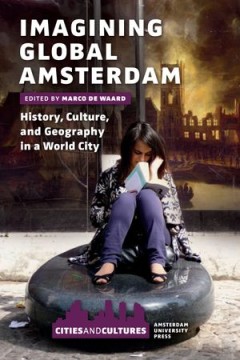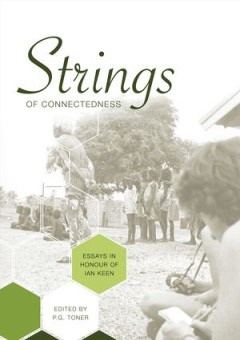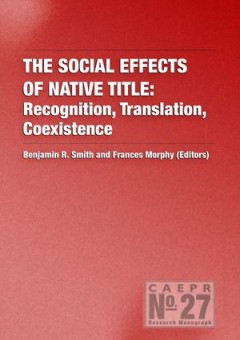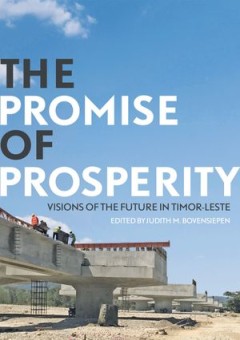Filter by

Legacies of Space and Intangible Heritage : Archaeology, Ethnohistory, and th…
This volume looks at how different physical environments contribute to the reproduction of cultural forms even in the wake of colonization, migration, and other processes of displacement and change. This raises the question of whether cultural practices are altered by changes in physical environment or if a group’s narratives and practices shape their location. Using case studies from North a…
- Edition
- -
- ISBN/ISSN
- 9781607327004
- Collation
- -
- Series Title
- -
- Call Number
- 973 LEG

A Sensory Education
A Sensory Education takes a close look at how sensory awareness is learned and taught in expert and everyday settings around the world. Anna Harris shows that our sensing is not innate or acquired, but in fact evolves through learning that is shaped by social and material relations. The chapters feature diverse sources of sensory education, including field manuals, mannequins, cookbooks and fla…
- Edition
- -
- ISBN/ISSN
- 9781000182156
- Collation
- -
- Series Title
- -
- Call Number
- 301 HAR s

Land, Life, and Emotional Landscapes at the Margins of Bangladesh
Drawing on two years of ethnographic research in the north-eastern borderlands of Bangladesh, this book focuses on the everyday struggles of indigenous farmers threatened with losing their land due to such state programmes as the realignment of the national border, ecotourism, social forestry and the establishment of a military cantonment. In implementing these programmes, state actors challeng…
- Edition
- -
- ISBN/ISSN
- 9789048553365
- Collation
- -
- Series Title
- -
- Call Number
- 320 HOL l

Imagining Global Amsterdam
Imagining Global Amsterdam brings together new essays on the image of Amsterdam as articulated in film, literature, art, and urban discourse, considered within the context of globalization and its impact on urban culture. Subjects include: Amsterdam’s place in global cultural memory; expressions of global consciousness in Amsterdam in the ‘Golden Age’; articulations of Amsterdam as a tole…
- Edition
- -
- ISBN/ISSN
- 9789089643674
- Collation
- -
- Series Title
- -
- Call Number
- 301 WAA i

Strings of Connectedness: Essays in honour of Ian Keen
For nearly four decades, Ian Keen has been an important, challenging, and engaging presence in Australian anthropology. Beginning with his PhD research in the mid-1970s and through to the present, he has been a leading scholar of Yolngu society and culture, and has made lasting contributions to a range of debates. His scholarly productivity, however, has never been limited to the Yolngu, and he…
- Edition
- -
- ISBN/ISSN
- 9781925022636
- Collation
- -
- Series Title
- -
- Call Number
- 301 TON s

The Social Effects of Native Title: Recognition, Translation, Coexistence
The papers in this collection reflect on the various social effects of native title. In particular, the authors consider the ways in which the implementation of the Native Title Act 1993 (Cwlth), and the native title process for which this Act legislates, allow for the recognition and translation of Aboriginal law and custom, and facilitate particular kinds of coexistence between Aboriginal tit…
- Edition
- -
- ISBN/ISSN
- 9781921313523
- Collation
- -
- Series Title
- -
- Call Number
- 301 SMI s

Skin, Kin and Clan: The dynamics of social categories in Indigenous Australia
Australia is unique in the world for its diverse and interlocking systems of Indigenous social organisation. On no other continent do we see such an array of complex and contrasting social arrangements, coordinated through a principle of ‘universal kinship’ whereby two strangers meeting for the first time can recognise one another as kin. For some time, Australian kinship studies suffered f…
- Edition
- -
- ISBN/ISSN
- 9781760461638
- Collation
- -
- Series Title
- -
- Call Number
- 301 SKI s

Sinuous Objects: Revaluing Women’s Wealth in the Contemporary Pacific
Some 40 years ago, Pacific anthropology was dominated by debates about ‘women’s wealth’. These exchanges were generated by Annette Weiner’s (1976) critical reappraisal of Bronisław Malinowski’s classic work on the Trobriand Islands, and her observations that women’s production of ‘wealth’ (banana leaf bundles and skirts) for elaborate transactions in mortuary rituals occupied a…
- Edition
- -
- ISBN/ISSN
- -
- Collation
- -
- Series Title
- -
- Call Number
- 300 SIN s

The Promise of Prosperity: Visions of the Future in Timor-Leste
For the people of Timor-Leste, independence promised a fundamental transformation from foreign occupation to self-rule, from brutality to respect for basic rights, and from poverty to prosperity. In the eyes of the country’s political leaders, revenue from the country’s oil and gas reserves is the means by which that transformation could be effected. Over the past decade, they have formulat…
- Edition
- -
- ISBN/ISSN
- 9781760462529
- Collation
- -
- Series Title
- -
- Call Number
- 301 PRO p

Tides of Innovation in Oceania Value, materiality and place
Tides of Innovation in Oceania is directly inspired by Epeli Hau‘ofa’s vision of the Pacific as a ‘Sea of Islands’; the image of tides recalls the cyclical movement of waves, with its unpredictable consequences. The authors propose tides of innovation as a fluid concept, unbound and open to many directions. This perspective is explored through ethnographic case studies centred on deeply…
- Edition
- -
- ISBN/ISSN
- 9781760460921
- Collation
- -
- Series Title
- -
- Call Number
- -
 Computer Science, Information & General Works
Computer Science, Information & General Works  Philosophy & Psychology
Philosophy & Psychology  Religion
Religion  Social Sciences
Social Sciences  Language
Language  Pure Science
Pure Science  Applied Sciences
Applied Sciences  Art & Recreation
Art & Recreation  Literature
Literature  History & Geography
History & Geography